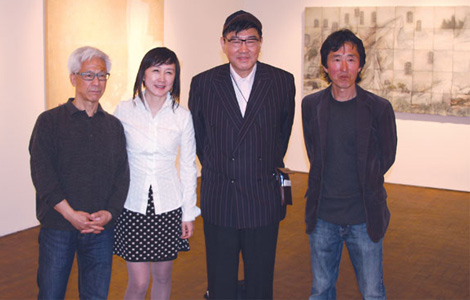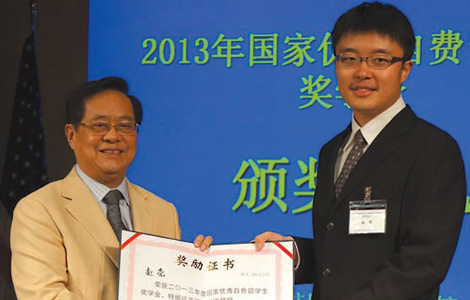Supreme Court ruling mixed news for SCA-5
Updated: 2014-04-24 10:52
By Amy He in New York (China Daily USA)
|
||||||||
The US Supreme Court's ruling that backed a Michigan ban on the use of affirmative action in admissions to the state's public universities means that a similar ban in California "is here to stay", says a University of California Los Angeles (UCLA) political science professor.
California's Proposition 209, passed in 1996, forbids consideration of race and gender in university admissions, and made it the first state to approve such legislation.
Tim Groseclose, the UCLA professor, said that because of the Supreme Court's 6-2 ruling on Tuesday Prop 209 isn't going to be overturned through the courts, and any attempt to overturn it would have to be done "legislatively".
And Groseclose believes overturning Prop 209 would be detrimental to Asian-American admission rates.
"I believe that if Prop 209 were overturned at UCLA, something like 600 fewer Asian students would be admitted each year," he said Wednesday in an interview with China Daily.
Asian and Pacific Islander students make up 35 percent of the student body at UCLA, which is higher than any other racial group, according to the school's enrollment statistics.
In January, state Senator Ed Hernandez authored a bill called the Senate Constitutional Amendment 5 - known as SCA-5 - that would have overturned Prop209 and allowed the state's public colleges and universities to admit students on the basis of race, gender, ethnicity, or national origin.
Hernandez said he wanted to do away with Prop 209 because he said it limited the number of minority students - particularly blacks and Hispanics - from getting into the state's schools.
The state Senate passed the bill, which was offered as a proposed amendment to the state constitution, on Jan 30. That action incited a backlash from some Chinese-American leaders who said that the bill would reduce the number of Asian students admitted and would be a form of racial discrimination.
The Senate-passed bill was to go onto the state Assembly, but Hernandez withdrew it because there didn't appear to be enough support to pass it.
Charles Liu, a Chinese community leader in California, said that the backing of Michigan's ban against affirmative action by the Supreme Court is "very good news for the opposition against SCA-5" because the ruling upholds Michigan's Proposition 2, which is nearly identical to California's Prop 209.
But Haipei Shue, president at the National Council of Chinese Americans, thinks that the Michigan ruling does not necessarily have direct implications for SCA-5.
"This is not a direct ruling on affirmative action. This is not a direct ruling on SCA-5," he said. "It doesn't talk about whether or SCA-5 or whether Proposition 209 has any merit, or by the same extension, the Michigan Proposition 2 has any merit or not."
The Supreme Court's ruling on Tuesday by 6-2 vote doesn't mention Asians or Asian Americans.
Supreme Court Associate Justice Anthony Kennedy wrote in an opinion that the case is "not about how the debate about racial preferences should be resolved. It is about who may resolve it. There is no authority in the Constitution of the United States or in this court's precedents for the judiciary to set aside Michigan laws that commit this policy determination to the voters."
If anything, this ruling may give those who back SCA-5 even more encouragement to push the bill through, Shue said. "It says that as long as it's decided by the people there, it should be okay. SCA5 is exactly going down that popular route," he said.
Shue said that the NCCA is opposed to SCA-5 - and joined the Chinese community in California to protest the proposal - but is at the same time "concerned about diversity on campus" and it would be in everybody's best interest not to consider race as a sole factor.
Joyce Moy, executive director at the Asian American/Asian Research Institute, said, "As a whole, Asian Americans do not oppose affirmative action. I think the community supports helping those who are disadvantaged."
"What the community opposes is when attempts to right the wrongs to another community unfairly and adversely affect the Asian community," she said.
Chen Jia contributed to this story. Contact her at chenjia@chinadailyusa.com
amyhe@chinadailyusa.com
(China Daily USA 04/24/2014 page1)

 Multilateral drill marks navy's 65th birthday
Multilateral drill marks navy's 65th birthday
 MOCA to open Chinese ink show
MOCA to open Chinese ink show
 China calls on talent worldwide
China calls on talent worldwide
 US sends troops to Poland for exercises
US sends troops to Poland for exercises
 French 'spiderman' scales 33-story building in Macao
French 'spiderman' scales 33-story building in Macao
 2014 China Graduate Fashion Week in Beijing
2014 China Graduate Fashion Week in Beijing
 Top 10 celebrities driving auto brands
Top 10 celebrities driving auto brands
 Childhood photos of Prince William and Kate
Childhood photos of Prince William and Kate
Most Viewed
Editor's Picks

|

|

|

|

|

|
Today's Top News
China calls on talent worldwide
Infrastructure opening to foreign investors
Supreme Court ruling mixed news for SCA-5
Obama criticized for Diaoyu Islands remarks
Opinion: Asia's future at risk
Jackson's doctor denied appeal
Another US warship enters Black Sea
Slower growth poses challenges: AmCham
US Weekly

|

|







